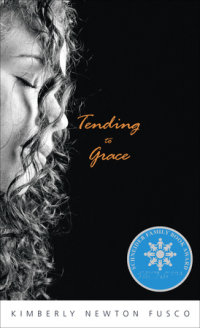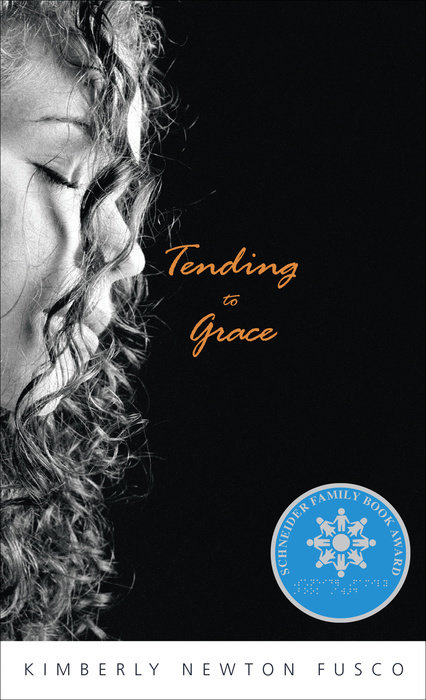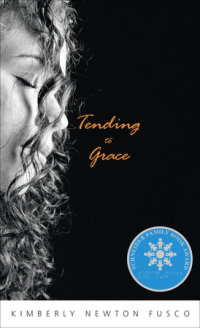Tending to Grace
Lenore is Cornelia’s mother—and Cornelia’s fix-up project. What does it matter that Cornelia won’t talk to anyone and is always stuck in the easiest English class at school, even though she’s read more books than anyone else? She feels strong in the fixing. She cooks vegetable soup so Lenore will eat something other than Ring Dings; she lures her out of bed with strong coffee and waffles. She looks after the house when Lenore won’t get out of bed at all.
So when Lenore and her boyfriend take off for Vegas leaving Cornelia behind with eccentric Aunt Agatha, all Cornelia can do is wait for her to come back. Aunt Agatha sure doesn’t want any fixing.
Maybe this time it’s Cornelia who could use it?
An Excerpt fromTending to Grace
1
We drive out Route 6 on a silent day at the end of May, my mother, the boyfriend, and I. We pass villages with daisies at the doorsteps and laundry hung in soft rows of bleached white. I want to jump out of the car as it rushes along and wrap myself in a row of sheets hanging so low their feet tap the grass. I want to hide because my life, if it were a clothesline, would be the one with a sweater dangling by one sleeve, a blanket dragging in the mud, and a sock, unpaired and alone, tumbling to the road with the wind at its heel.
But I don't say anything as we head east.
My mother is a look-away.
2
My teacher is a look-away.
I am a bookworm, a bibliophile, a passionate lover of books. I know metaphor and active voice and poetic meter, and I understand that the difference between the right word and the almost right word, as Samuel Clemens said, is the difference between lightning and the lightning bug.
But I don't talk, so no one knows. All they see are the days I miss school, thirty-five one year, twenty-seven the next, forty-two the year after that. I am a silent red flag, waving to them, and they send me to their counselors and they ask me, "When are you going to talk about it, Cornelia?" I wrap myself into a ball and squish the feelings down to my toes and they don't know what to make of me so they send me back to this class where we get the watered-down Tom Sawyer with pages stripped of soul and sentences as straight and flat as a train track.
We read that the new boy in Tom Sawyer ran like a deer, while the kids in the honors class read he "turned tail and ran like an antelope."
I know, because I read that book, too.
3
Sam finishes reading; Allison begins. Up one row and down another we go like a set of dominoes, each kid taking a turn at reading aloud and me waiting for my morning to collapse.
" 'It was Monday morning and Tom Sawyer was miserable,'" Allison reads. "'He was always miserable on Monday mornings because it meant he had to go to school.'"
The copy of Tom Sawyer they use for this class sits open on my desk. The one Mark Twain wrote sits on my lap. I match paragraphs to keep my mind on something other than my approaching turn:
"Monday morning found Tom Sawyer miserable. Monday morning always found him so--because it began another week's slow suffering in school."
Allison finishes and Betsy begins. We read aloud in this class because the teacher doesn't believe we read at home. And so I wait, my stomach rolling, a lost ship at sea. We may be reading Tom Sawyer for babies, but Betsy's voice, as strong and supple as a dancer, hardly notices. She skips along the tops of passive verbs and flies over the adjectives and adverbs that stack and pile up like too many Playskool blocks. When Betsy finishes, the teacher looks over at me and her eyes widen just a bit.
"Cornelia, will you be reading today?" Her voice pitches too high, too singsong. Kids turn around. Everyone knows she gives no one else a choice.
I shake my head and look at my feet.
4
I am a shadow. I burrow deeper within myself and pray that if the other kids don't see me, they won't talk to me. I pretend I am the desk, the book, the floor, and we all expect less of me each day. I try not to lose myself, but the shame of always looking at my feet beats me deeper and deeper into the earth, planting me as surely as my mother planted gardenia bulbs one summer, facedown.
5
No one likes the new girl. Her name is Ruth. She wears the goofiest glasses I've ever seen. But I like her. I like the way she looks me in the eye when I tell her something. She is kind underneath those glasses and she smiles when I joke around. I want to tell her my whole life story in ten minutes, quicklike so the words tumble down, fast and furious, like my mother's promises. But I don't know how to begin, so we talk about books, which is the second-favorite reason why I like her so much.
We have just read Oliver Twist, me for the second time, and we are trying to figure out how Oliver survived on the gruel they made him eat at the workhouse. We made a pact to live on gruel for one day, cold and without sugar, but unlike Oliver, our portions are un-limited. Ruth brought Cream of Wheat. I brought oatmeal and it sits like cold clotted gravy on my tongue.
The girls in the lunch line point to us. The empty seats beside us are magnets. I concentrate on my spoon. I wonder if they'll notice our lunch. How disgusting. How odd. How much of a loser can you be, Cornelia Thornhill?
I stuff my bowl into my bag and push it into my backpack.
"Hey, we're not done," Ruth says. Her back is to the girls; she hasn't noticed. I nod toward them. She turns and hides her bowl in her notebook and stands up to leave. She is sturdier than I, more of an eggplant to my celery stick. I am so hungry.
"Oh, don't go on account of us," says Eleanor, the tallest of the three breezing toward us. She has had a perfect mouth from the beginning of time, one that never has--and never will--need braces. I stare absently into the crowded lunchroom.
"How are you today, Cornelia?" Eleanor takes her napkin, puts it on her lap, and ignores Ruth. I take my napkin and wipe my mouth.
I smile quickly and sip my milk.
"Did you get the last answer on the test?" Eleanor asks.
I shake my head. The other girls are snickering behind their napkins.
She tries again. "You didn't read again today. How come?"
I take another sip and shrug. Eleanor is waiting for me to answer. I take another sip and wipe my mouth. I start wiping my lips with each sip now, afraid something else horrible will fall out of my mouth. Seven, eight, nine times, I mop my mouth.
Eleanor laughs and then her friends laugh and when I can't listen anymore, I stand up and run out the side door of the cafeteria. The lunch aide hollers and the force of it follows me all the way to the street, where my tears mix with rain.


